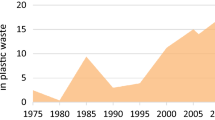Abstract
-
Sustainable chemistry - Section editors: Klaus Günter Steinhäuser, Steffi Richter, Petra Greiner, Jutta Penning, Michael Angrick
Background, Aim and Scope
Chemicals play a vital role in the day-to-day life of industrialised societies. Their use is not restricted to the chemical enterprises per se, but is a crucial part of production processes in a lot of industrial sectors. Traditional instruments of environmental policy (such as bans, restrictions) can only deal with the most hazardous substances. The Johannesburg Implementation Plan of 2002 calls for more sustainable patterns of production and consumption, and sets the year of 2020 as a goal to use chemicals in a way that human health and the environment are not endangered. Political instruments should not only gather more knowledge about the properties of chemicals, but should also stimulate the environmentally sound use of chemicals. Existing business models should therefore be reviewed in relation to this strategic approach to encourage marketing options with respect to the environmental focus.
Main Features
Business models were examined for their effects on the consumption of chemicals and amount of waste emissions in relation to their economic potential. Different possibilities for cooperation of supplier, user and disposal companies were elaborated and examined with a view to the specific situation in Austria.
Results and Discussion
A range of cooperative models – summarised under the term ‘chemical leasing’ - was identified, which can contribute to a more efficient use of resources. 12 main possible application areas (cleaning, lubrication, paint stripping and others) have been identified in Austria. If chemical leasing models were applied in these areas, the amounts of chemicals currently used could be reduced by one third (53,000 tonnes per year). Cost reductions of up to 15 % can be expected.
Conclusion
The application of chemical leasing models can contribute considerably to achieving more sustainable and resource-efficient patterns of production. The Austrian Ministry for Environment has therefore decided to subsidise the further practical implementation of these new service-oriented business models. Pilot projects in 4 enterprises, which are supervised by consulting companies, are currently being carried out.
Recommendation and Outlook
The experiences of the pilot projects will serve as valuable building blocks for the wider use of chemical leasing models. Furthermore, the UNIDO Cleaner Production Centres have expressed their clear interest and will examine the possibility to use chemical leasing as a part of their Cleaner Production Programmes.
Similar content being viewed by others
Author information
Authors and Affiliations
Corresponding authors
Rights and permissions
About this article
Cite this article
Perthen-Palmisano, B., Jakl, T. Chemical Leasing - Cooperative business models for sustainable chemicals management - Summary of research projects commissioned by the Austrian Federal Ministry of Agriculture, Forestry, Environment and Water Management (5 pp). Env Sci Poll Res Int 12, 49–53 (2005). https://doi.org/10.1065/espr2004.12.227
Received:
Accepted:
Published:
Issue Date:
DOI: https://doi.org/10.1065/espr2004.12.227




